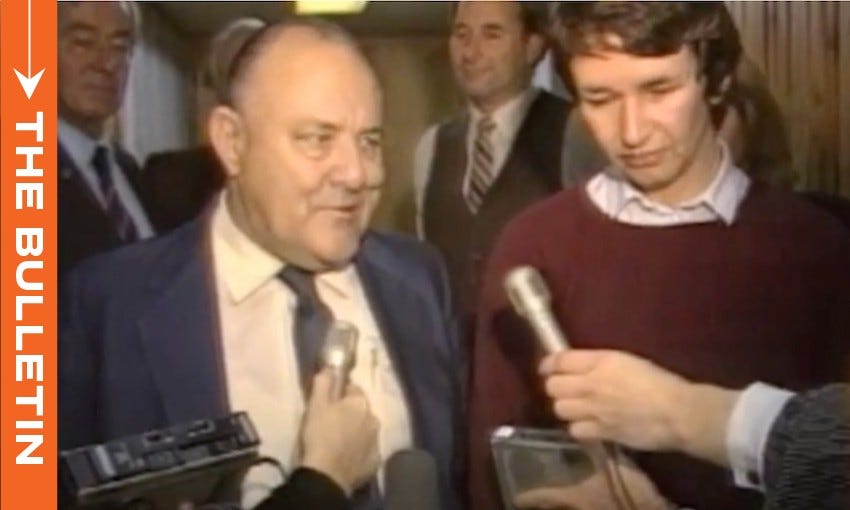The parallels between 1984 and today
It's four decades since Robert Muldoon's infamous decision to call a snap election.
Mōrena, and welcome to The Bulletin for Friday, June 14.
In today’s edition: The Chinese premier ignores a question on his country’s influence in New Zealand, a proposed hiring freeze at Health NZ, and concerns about competition in Australia as Chemist Warehouse proposes a merger. But first, it’s 40 years since Muldoon’s infamous call for a snap election.
Four decades since the ‘schnapps’ election
Today marks 40 years since a visibly drunk Robert Muldoon called a snap election. It was a decision that, as The Spinoff’s new podcast Juggernaut examines in great detail, led to serious and enduring change in New Zealand. Given it's the anniversary, I went back and read Newstalk ZB journalist Barry Soper’s account of what happened on June 14, 1984 – and it’s compelling. “Never before or since has a politician appeared in front of the television cameras in such a drunken state,” wrote Soper, who was there on the night. You only need to type the words “Robert Muldoon” into Papers Past to be presented with an array of reports from the night itself, like this from The Press. Considering the consequences the election triggered, they’re all quite soberly reported. I’ll leave an examination of the change that followed to Toby Manhire over the next six weeks of Juggernaut, but given it’s the anniversary of one of the most iconic moments in our political history, let's look at some of the similarities between 1984 and 2024.
‘We’re in as much trouble today as we were in 1984’
That’s according to former Labour finance minister, and later Act Party co-founder, Roger Douglas. As Manhire describes it to me, Roger Douglas just won't quit. “When he came into The Spinoff to talk about the fourth Labour government and his role in those tumultuous years for our new podcast Juggernaut, he was just as keen to get stuck into the here and now.” As you can read on The Spinoff this morning, Douglas reckons things are as dire now as they were in 1984 and demand another radical response.
According to Douglas, the parallels are clear. In 1984, Douglas and the new Labour government inherited an economy in crisis. The coalition government of 2023 has made similar comments. In late 2023, Willis said the government books laid bare “the extent of Labour’s economic and fiscal vandalism”. Douglas told Manhire: “We’re in as much trouble today as we were in 1984.” Douglas has urged radical action to address today’s crises, something Willis has erred away from. “We don’t want to be radical,” she told Mike Hosking ahead of budget day.
In 2023, Douglas penned an open letter, first reported by BusinessDesk, that questioned why the party he co-founded was not responding more aggressively to the current challenges. In response, David Seymour told The Spinoff he acknowledged Act was not as “radical” as Douglas may have wanted.
The ‘strands’ that link two eras
Manhire tells me there are other “strands” that connect the fourth Labour government and today. “Whether it's a specific (such as the drafting of Treaty principles) or a theme (eg prime ministers finding life more agreeable abroad than at home) there are links all over the show,” he says. “And of course the biggie, the perennial: the question over just how active a role the state should have in our lives.” In 1989, the fourth Labour government became the first to set out principles to guide its actions on matters relating to the Treaty of Waitangi, as Te Ara explains here. It remains a hot button topic, thanks to an Act proposal inked into the coalition agreement with National to redefine the principles and set them in stone via legislation. Victoria University’s Luke Fitzmaurice-Brown looked back at the history of the principles in this Newsroom piece earlier in the year, but in recent weeks we’ve taken a step forward to that bill becoming a reality (though National has ruled out taking it beyond first reading). In May, 1News’ Te Aniwa Hurihanganui reported that the coalition had started the process of reviewing at least 40 pieces of legislation that included Treaty principles clauses, something that was agreed between National and New Zealand First.
The other parallel? The snap election itself
One other connection between the two eras is further afield: the idea of a snap election. In France, Emmanuel Macron recently announced that following a poor result in the European Union elections, he would be putting his leadership on the line earlier than anticipated. As The Guardian explained, Macron described his decision to go to a vote as an “act of confidence”, believing that the French people would “make the best choice for themselves and for future generations”. The Spinoff’s Catherine McGregor went into more depth in this week’s edition of The World Bulletin (which you can access as a Spinoff Member), explaining that the president is wanting to test France’s “readiness” for the far right, or prove that the recent election result was simply a “letting-off of steam”. While certainly emboldened by alcohol, Muldoon similarly called the 1984 election to try to prove he had a mandate and to dispel criticism over the state of the economy. But as BusinessDesk’s Pattrick Smellie wrote last year, when there were murmurings of Chris Hipkins calling a snap election, voters tend not to think kindly of an unexpected trip to the polls. The rest is history. Though less a “snap” election and more a slightly unexpected one, it’s just three weeks until the UK heads out to vote. The latest debate between prime ministerial contenders Keir Starmer and Rishi Sunak took place yesterday, and I highly recommend this report from The Guardian’s Marina Hyde on what unfolded.
Listen to Juggernaut: The Story of the Fourth Labour Government here.
Join The Spinoff Members
“The Spinoff has given me my faith in good journalism back.” Anja, Spinoff member since 2020. If, like Anja, you value our work and want to support us, please consider becoming a member today. Already a member? Ka nui te mihi, your support means the world to us.
Luxon-Li talks were ‘50-50’ shared interests and differences
Prime minister Christopher Luxon met with Chinese premier Li Qiang yesterday in Wellington, and as Newsroom’s Sam Sachdeva reported, both sides were keen to emphasise the health of the relationship. But while the two talked up trade during a joint press conference, Luxon later told media that their discussion was “probably 50-50” between shared interests and differences. Politik’s Richard Harman noted the contrast between the last visit by a Chinese premier, back in 2017, and this week. As he writes, “though Luxon wouldn’t reveal any details, he confirmed that the Chinese brought up the prospect of New Zealand joining pillar two of AUKUS, a move that their ambassador here has made clear China would oppose”.
The premier’s visit coincides with the release of a feature length new Stuff documentary, the Long Game, that provides revelations of Chinese influence in New Zealand. Leading Stuff this morning is a report from Paula Penfold and Louisa Cleave about an alleged kidnap in New Zealand that was said to have been ordered by the Chinese government. Li did not take questions during the joint presser, but Stuff’s Bridie Witton attempted to ask him about allegations of spying. He did not respond, while Luxon said he had not read Stuff’s coverage. Meanwhile, The Post’s Justin Wong reported that many of the supporters that lined the streets to welcome Li to Wellington were invited by the Chinese Embassy.
Proposed pay, hiring freezes at health agencies
On the front page of today’s Herald, Azaria Howell has reported on a proposal by the Ministry of Health to freeze pay increases to workers above the mid-range, prompting a pushback from staff. According to Howell, higher paid workers were told they could go without a pay rise. After worker feedback, including claims the proposal “created feelings of being undervalued and marginalised”, the ministry has agreed to a one-off lump sum payment, “based on performance rating and position, for staff in pay bands from 12, a starting range, to 16”. Meanwhile, RNZ has details of a reported hiring freeze for all non-frontline roles at Health NZ, according to a leaked document sent to all staff yesterday.
Listen: Why is the Reserve Bank continuing to hold the OCR?
Reserve Bank chief economist Paul Conway joins Bernard in the immediate aftermath of a surprisingly hawkish monetary policy statement, and just before the Budget. Together they discuss sources of inflation, why interest rates are staying high for longer than anyone expected, and whether the blunt instrument of the official cash rate can do anything about this extra-sticky inflation.
Click and Collect
Premier Li is heading to Australia after his brief tour of New Zealand – and he could be bringing some good panda news. We have our own storied history with “panda diplomacy”, largely under former PM John Key, but no animals ever ended up in any of our zoos.
Act’s David Seymour, wearing his minister of regulation hat, has announced a review into red tape in the farming sector.
On the front page of The Post, Chris Bishop’s big pitch for more user pays and private capital in infrastructure.
The Chemist Warehouse expansion across New Zealand and Australia has been rapid. As the NBR reports (paywalled), Australia’s consumer watchdog has concerns about a proposed merger across the ditch.
The government’s developing a new voluntary pay gap calculator for companies, dumping Labour’s plans to make reporting on gender pay mandatory.
Jen Purdie argues that New Zealand’s plan to revive offshore oil exploration doesn’t add up. Isobel Ewing and her mate Georgia Merton rode their bikes through northern Pakistan for a month and made a film about it. Why Kate Gordon-Smith started an online bookshop, and what she’s learnt so far. Tara Ward dives deep into the first trailer for series two of The Traitors NZ, and asks what we know so far. Hera Lindsay Birds answers whether it’s wrong to revel in an unrequited crush for the latest Help Me Hera.
That’s it for The Bulletin this week, thanks for reading. I’ll be back bright and early on Monday.
Got some feedback about The Bulletin, or anything in the news? Get in touch with me at thebulletin@thespinoff.co.nz.
If you liked what you read today, share The Bulletin with friends, family and colleagues.















Pandas Auckland Zoo 1988 or so. Really tough to photograph though.
Aaaah! The memories... I was home recuperating for the 1984 snap election & having the time to take notice is what got me hooked on following the people & policies that impact everyday people. I shall be tuning in to the podcast, but might be tempted to throw things when Muldoon, Douglas etc. come on! 🤬 Sadly the hubris & lack of empathy for the reality of our everyday challenges as "ordinary citizens" has not got improved, and now there is less excuse IMHO... 🤷